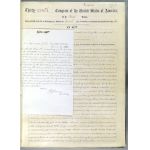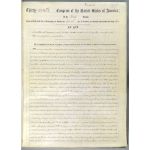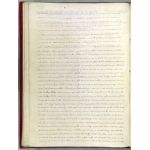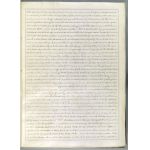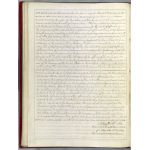Civil Rights Act of 1866
4/9/1866
Add to Favorites:
Add all page(s) of this document to activity:
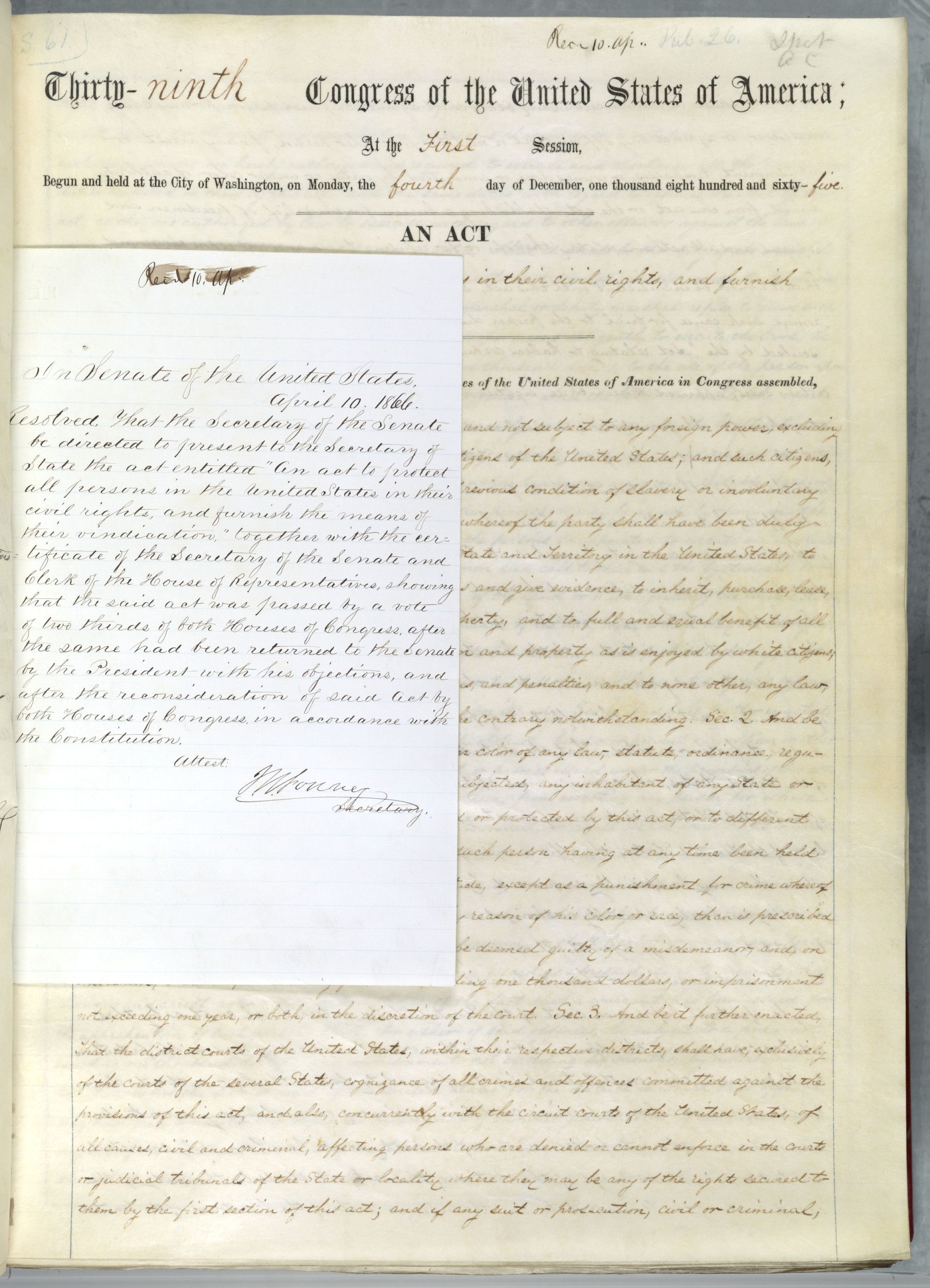
Add only page 1 to activity:
Add only page 2 to activity:
Add only page 3 to activity:
Add only page 4 to activity:
Add only page 5 to activity:
Add only page 6 to activity:
This Act was the first attempt at civil rights legislation after the 13th Amendment abolished slavery. Its landmark language attempted to put African-Americans on equal footing with whites. It guaranteed basic economic rights to contract, sue, and own property; and it paved the way for the 14th Amendment.
After the destruction caused by the Civil War, some Americans believed Congress was warranted on trying to remove the marks left behind by slavery. This act conveyed the ideals of the Radical Republicans, who saw the end of the Civil War as an opportunity to create an egalitarian society. Opponents argued that this was an unprecedented and unwanted intrusion into local government by the Federal Government.
Though it was vetoed by President Andrew Johnson, it was voted into law by a two-thirds majority in both houses of Congress which overcame the President's veto.
After the destruction caused by the Civil War, some Americans believed Congress was warranted on trying to remove the marks left behind by slavery. This act conveyed the ideals of the Radical Republicans, who saw the end of the Civil War as an opportunity to create an egalitarian society. Opponents argued that this was an unprecedented and unwanted intrusion into local government by the Federal Government.
Though it was vetoed by President Andrew Johnson, it was voted into law by a two-thirds majority in both houses of Congress which overcame the President's veto.
The written title is "An Act which protected all persons in the United States in their civil rights and furnished the means of their vindication." It is also known as Public Law 39-26, 14 STAT 27.
Transcript
[page 1][handwritten and offset in half box] 69
[handwritten] Recd. 10. Apr Pub. 26 [illegible]
AC
[typeset] Thirty- [handwritten] ninth [end handwritten] Congress of the United States of America;
At the [handwritten] First [end handwritten] Session,
Begun and held at the City of Washington, on Monday, the [handwritten] fourth [end handwritten] day of December, one thousand eight hundred and sixty- [handwritten] five.
[end handwritten]
[horizontal line across half of page]
AN ACT
[handwritten] To protect persons in the United States in their civil rights, and furnish the means of their vindication. [end handwritten]
[horizontal line across half of page]
Be it enacted by the Senate and House of Representatives of the United States of America in Congress assembled, That [end typeset] [remainder of document handwritten] all persons in the United States and not subject to any foreign power, excluding Indians not taxed, are hereby declared to be citizens of the United States; and such citizens, of every race and color, without regard to any previous condition of slavery or involuntary servitude, except as a punishment for crime whereof the party shall have been duly convicted, shall have the same right, in every State and Territory in the United States, to make and enforce contracts, to sue, be parties and give evidence, to inherit, purchase, lease, sell, hold, and convey real and personal property, and to full and equal benefit of all laws and proceedings for the security of person and property as is enjoyed by white citizens; and shall be subject to like punishment, pains, and penalties, and to none others any law, statute, ordinance, regulation, or custom, to the contrary notwithstanding.
Sec. 2. And be it further enacted, That any person who under color of any law, statute, ordinance, regulation, or custom, shall subject, or cause to be subjected, any inhabitant of any State or Territory to the deprivation of any right secured or protected by this act, or to different punishment, pains, or penalties on account of such person having at any time been held in a condition of slavery or involuntary servitude, except as a punishment for crime whereof the party shall have been duly convicted, or by reason of his color or race, than is prescribed for the punishment of white persons, shall be deemed guilty of a misdemeanor, and, on conviction, shall be punished by fine not exceeding one thousand dollars, or imprisonment not exceeding one
year, or both, in the discretion of the court.
Sec. 3. And be it further enacted, That the district courts of the United States, within their respective districts, shall have, exclusively of the courts
of the several States, cognizance of all crimes and offenses committed against the provisions of this act, and also, concurrently with the circuit courts of the United States, of all causes, civil and criminal, affecting persons who are denied or cannot enforce in the courts or judicial tribunals of the State or locality where they may be any of the rights secured to them by the first section of this act; and if any suit or prosecution, civil or criminal,
[missing pages containing rest of Section 3, Sections 4-10, and signatures]
In the Senate of the United States
April 6,1866
The President of the United States having returned to the Senate, in which it originated, the bill entitled “An act to protect all persons in the United States in their civil rights, and furnish the means of their vindication.” with his objections thereto, the Senate proceeded, in pursuance of the Constitution, to reconsider the same; and [underline Resolved. [end underline] That the said
bill do pass two-thirds of the Senate agreeing to pass the same.
Attest:
[signed] J.W. Forney
Secretary of the Senate.
In the House of Representatives, U.S. April 9th . 1866.
The House of Representatives having proceeded, in pursuance of the Constitution, to reconsider the bill entitled “An act to protect all persons in the United States in their civil rights, and furnish the means of their vindication,” returned to the Senate by the President of the United States, with his objections, and sent by the Senate to the House of Representatives, with the message of the President returning the bill:__Resolved, That the bill do pass, two-thirds of the House of Representatives agreeing to pass the same.
Attest:
[signed] Edward McPherson
Clerk
By Clinton Lloyd
Chief Clerk
This primary source comes from the General Records of the United States Government.
National Archives Identifier: 299820
Full Citation: Act of April 9, 1866 (Civil Rights Act), Public Law 39-26, 14 STAT 27, which protected all persons in the United States in their civil rights and furnished the means of their vindication; 4/9/1866; Enrolled Acts and Resolutions of Congress, 1789 - 2011; General Records of the United States Government, Record Group 11; National Archives Building, Washington, DC. [Online Version, https://www.docsteach.org/documents/document/civil-rights-act-1866, April 23, 2024]Rights: Public Domain, Free of Known Copyright Restrictions. Learn more on our privacy and legal page.



